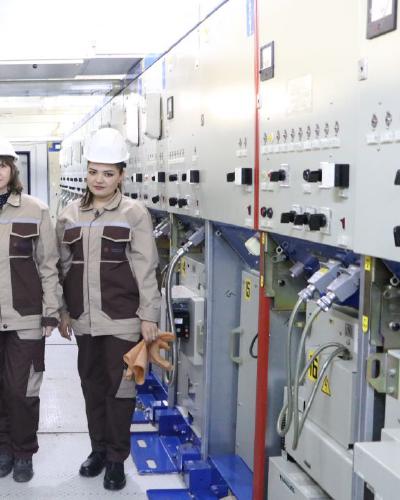Uzbekistan is digitalizing its power distribution system while empowering women to pursue professional careers in the power sector, with support from ADB and France, through the Agence Française de Développement.
power distribution problems
Uzbekistan’s power distribution system, serving 7.6 million consumers, suffers from aging and outdated infrastructure.
Over half of its distribution lines have exceeded their intended lifespan, and a third of substation transformers are in urgent need of replacement. Power outages, overloads, and voltage drops are frequent.
While the nationwide rollout of advanced metering has curbed nontechnical losses, system-wide distribution losses remain stubbornly high at 13%, contributing to energy inefficiency and increased emissions. And despite achieving universal household electrification, service reliability is still a concern—urban areas suffer from intermittent supply, while rural areas experience prolonged outages, particularly during winter.
These outages disrupt essential social services and disproportionately affect women, who are the primary household electricity users. Power outages increase women’s household workload and limit their opportunities for education and income-generating activities.
Recognizing these challenges, the government of Uzbekistan launched ambitious energy sector reforms in 2019. These efforts aim to improve service quality, promote market competition, and attract private investments, particularly in clean energy. The reforms have opened the door to renewable energy projects, market liberalization, and greater private capital mobilization. However, challenges remain.
Regulatory and institutional shortcomings, power market inefficiencies, and incomplete tariff reforms continue to constrain sector performance and deter investment. Sector’s state-owned enterprises need to strengthen their financial sustainability, corporate governance, and institutional capacity.
To enhance system resilience, Uzbekistan is actively promoting distributed renewable energy solutions—small, localized systems installed close to where the energy is consumed, such as in public buildings, households, and remote areas. However, scaling up these solutions requires modern digital infrastructure to balance supply and demand fluctuations and manage network reliability and flexibility.
Following the successful implementation of the smart metering program, Uzbekistan’s Regional Electrical Power Networks (REPN) is better informed and experienced in advancing digitalization. With support from ADB and other development partners, REPN has adopted institutional reforms, including a corporate efficiency plan and a long-term investment master plan. However, the REPN needs sustained investment to strengthen its network, address bottlenecks, improve efficiency, and bolster financial and technical capacity.
“Uzbekistan has been prioritizing energy infrastructure modernization, energy efficiency improvements, and clean energy solutions. Support from ADB and development partners will be vital in modernizing the power distribution network to achieve Uzbekistan’s long-term green and low-carbon growth strategy,” Seung Duck Kim, ADB principal energy specialist, said.
“Uzbekistan’s comprehensive approach to transform its power sector—by digitalizing its electricity distribution system and empowering women in the energy sector, all while building institutional capacity—will pave the way for a sustainable and climate-resilient energy future.”

transforming the power sector
In 2023, ADB launched a project to improve the reliability and efficiency of Uzbekistan’s electricity distribution grid. Supported by the Agence Française de Développement, this project is expected to contribute to broader social and economic development through enhanced green infrastructure services.
Electricity distribution substations across Uzbekistan will be upgraded with temperature-resilient equipment and efficient cooling systems. Advanced systems such as supervisory control and data acquisition (SCADA) and digital protection relays will be installed to enhance operational reliability and prevent regional blackouts during extreme weather. All substations will be SCADA-ready, enabling connection to the nationwide SCADA system. A feasibility study and rollout strategy for a distribution-level SCADA system will be developed to guide future investments.
Importantly, this transformation includes a focus on gender inclusion. The REPN will implement a gender mainstreaming strategy to increase women’s and girls’ participation in the energy sector. Customized training programs and campaigns for women students will be designed in partnership with Tashkent State Technical University, with plans to expand these programs to other regions, creating a knowledge platform for women in the energy sector.
The project will further support REPN’s financial recovery action plan and strengthen its financial management capacity. Climate resilience measures will be integrated into the project planning and design stages, while staff training for REPN will ensure the new digital substations are operated and maintained effectively for years to come.
“Uzbekistan’s comprehensive approach to transform its power sector—by digitalizing its electricity distribution system and empowering women in the energy sector, all while building institutional capacity—will pave the way for a sustainable and climate-resilient energy future,” Seung Duck Kim, ADB principal energy specialist, said.
power and gender equity in the future
ADB’s project with the Agence Française de Développement supports Uzbekistan’s move toward a vibrant and inclusive market economy by modernizing energy infrastructure and increasing energy efficiency. It aligns with the broader goals of gender equality, climate resilience, and energy security.
The digital substations deliver long-term advantages in investment, operational costs, and grid reliability, particularly with increasing distributed renewable energy integration. As distributed renewable energy systems become more widespread, new technical skills will be in demand. This creates opportunities for women to engage in the energy sector, build professional capacity, and access new livelihoods.
Set for completion in 2028, the project is on track to support Uzbekistan’s ambitions for economic growth and energy modernization.

